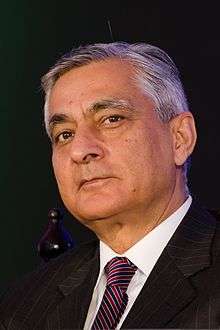Chief Justice of India
| CJI of India | |
|---|---|
|
Emblem of the Supreme Court of India | |
| Judiciary of India | |
| Abbreviation | CJI |
| Seat | New Delhi |
| Nominator | Collegium of the Supreme Court |
| Appointer | President of india |
| Term length | till the age of 65 yrs[1] |
| Constituting instrument | Constitution of India (under Article 124) |
| Formation | 1950 |
| First holder | Justice H. J. Kania (26/01/1950 - 06/11/1951)[2] |
| Website | Supreme Court of India |
| This article is part of a series on |
| Judiciary of India |
|---|
 |
| Law of India |
|
Civil courts
|
|
Criminal courts
|
|
Executive Court
|
|
Legal profession
|
|
Legal education |
The Chief Justice of India (CJI) is the head of the judiciary of India[3] and the Supreme Court of India. The CJI also heads their administrative functions.
As head of the supreme court, the chief justice is responsible for the allocation of cases and appointment of constitutional benches which deal with important matters of law. In accordance with Article 145 of the Constitution of India and the Supreme Court Rules of Procedure of 1966, the Chief Justice allocates all work to the other judges who are bound to refer the matter back to him or her (for re-allocation) in any case where they require it to be looked into by a larger bench of more judges.
On the administrative side, the Chief Justice carries out the following functions: maintenance of the roster; appointment of court officials and general and miscellaneous matters relating to the supervision and functioning of the Supreme Court.
It has been an unbroken convention for decades now, to appoint the senior-most judge of the supreme court as the CJI.[4]
The present CJI is Justice T. S. Thakur, and is the 43rd CJI since January 1950, the year the constitution came into effect and the supreme court came into being. He succeeded Justice H. L. Dattu on 3 December 2015 and will remain in office till 3 January 2017, the day he turns 65 years of age.
Appointment
Article 124 of the Constitution of India provides for the manner of appointing judges to the Supreme Court. Though no specific provision exists in the Constitution for appointing the Chief Justice, who, as a result, is appointed like the other judges[5] conventionally, the outgoing CJI recommends the name of the senior-most judge (i.e. by date of appointment to the Supreme Court) for appointment by the President of India, as his successor.[6]
However, this convention has been breached on a few occasions, most notably during the tenure of prime minister Indira Gandhi, when she got Justice A.N. Ray appointed as CJI, superseding three judges senior to him allegedly because he had favoured her government, and when Justice H. R. Khanna was overlooked for the post for upholding the constitution as superior to her government's acts and for curtailing her powers which she had arrogated to herself during the Emergency, a time when her government was becoming increasingly mired in a political and constitutional crisis.[7]
Removal
Article 124(4) of Constitution of India lays down the procedure for removal of a Judge of Supreme Court which is applicable to Chief Justice as well. Once appointed, the Chief Justice remains in office until the age of 65 years. He can be removed only through a process of impeachment by Parliament as follows:
A Judge of the Supreme Court shall not be removed from his office except by an order of the President passed after an address by each House of Parliament supported by a majority of the total membership of that House and by a majority of not less than two-thirds of the members of that House present and voting has been presented to the President in the same session for such removal on the ground of proved misbehaviour or incapacity.— Article 124(4), Constitution of India, Source:[5]
Acting President
The President (Discharge of Functions) Act, 1969 of India provides that the Chief Justice of India (CJI) shall act as the President of India in the event of the offices of both the President and the Vice President being vacant. When President Zakir Hussain died in office, the Vice President V. V. Giri, acted as the President. Later, Mr. Giri resigned as the Vice President. The CJI, Justice Mohammad Hidayatullah then became the acting President of India. The senior-most judge of the Supreme Court became the acting CJI. When the newly elected President took office a month later, Justice Hidayatullah reverted as the Chief Justice of India,
List of Chief Justices of India
- ‡ - Date of Resignation
- ‡‡ - Date of Death
Remuneration
The Constitution of India gives the power of deciding remuneration as well as other conditions of service of the Chief Justice to the Parliament of India. Accordingly, such provisions have been laid down in The Supreme Court Judges (Salaries and Conditions of Service) Act, 1958.[9][10]
| The sixth central pay commission recommended revision in the salaries and other allowances and pensionary benefits of the central government employees, including the high court and supreme court judges and all India services. The government has accepted the majority of recommendations of the commission and issued orders.[11] | "+" Salary of Chief Justice of India | Date | Salary |
|---|---|---|---|
| 1 January 1996 | ₹33,000 (US$490)[10] | ||
| 1 January 2006 | ₹100,000 (US$1,500)[9] |
See also
References
- ↑ "Supreme Court of India - CJI & Sitting Judges". Retrieved 4 July 2015.
- ↑ "Supreme Court of India Retired Hon'ble the Chief Justices' of India". Retrieved 4 July 2015.
- ↑ Narasimham, R L, Justice (CJ, Orissa H. C.). "Chief Justice Sinha - A Review of Some of His Decisions (page 5 of 8)" (PDF). Indian Law Institute.
- ↑ Alok (26 November 2010). "How India missed getting its first woman Chief Justice India". Critical Twenties. Retrieved 2016-09-04.
- 1 2 "Article 124, Constitution of India". Vakilno1.com. Archived from the original on 26 Dec 2010. Retrieved 11 October 2012.
- ↑ Venkatesan, J. (4 November 2015). "TS Thakur to succeed HL Dattu as new Chief Justice of India". Asian Age. Retrieved 5 November 2015.
- ↑ http://www.lexsite.com/services/network/scba/history.shtml
- ↑ Also served as Acting President of India and Vice-President of India.
- 1 2 "The High Court and Supreme Court Judges Salaries and Conditions of Service Amendment Bill 2008" (PDF). PRS India.
- 1 2 "Supreme Court Judges (Salaries and Conditions of Service) Act 1958" (PDF). Ministry of Home Affairs, India. Archived from the original (PDF) on 4 Jan 2011. Retrieved 23 July 2012.
- ↑ http://www.prsindia.org/uploads/media/vikas_doc/docs/1241592662~~1230018357_The_High_Court_and_Supreme_Court_Judges__Salaries_and_Conditions_of_Service__Amendment_Bill__2008.pdf

